Cursing
with pepper corns
Seenigama Devalaya the place where people come to ask
God Devol to punish those who have done them wrong
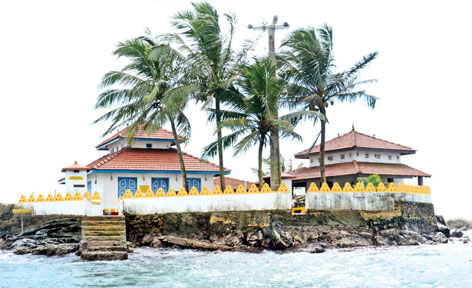 Seenigama Devalaya where God Devol reigns is a Buddhist shrine along
the Southern coast about 110 km from Colombo, between Ambalangoda and
Hikkaduwa. A twin-temple complex, it is visited by thousands of pilgrims
from all religions, seeking to fulfil vows, to bring down the wrath of
God Devol on their enemies and on those who have done them ill, or
secure his blessings for health and prosperity. Seenigama Devalaya where God Devol reigns is a Buddhist shrine along
the Southern coast about 110 km from Colombo, between Ambalangoda and
Hikkaduwa. A twin-temple complex, it is visited by thousands of pilgrims
from all religions, seeking to fulfil vows, to bring down the wrath of
God Devol on their enemies and on those who have done them ill, or
secure his blessings for health and prosperity.
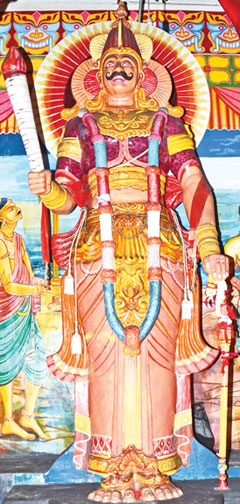 The main temple is located on the beach and the other is offshore,
about 300 metres away on small island, reachable only by a ferry boat. The main temple is located on the beach and the other is offshore,
about 300 metres away on small island, reachable only by a ferry boat.
A well-spring of myth and legend, the temple is believed to be
anything from 300 to 1,000 years old, though there is no evidence to
back the latter. The Sunday Observer recently set out to explore the
allure of Seenigama Devalaya, among those seeking blessings and among
those seeking vengeance.
The main temple offers a spectacular sight with the yellow 'Makara
Thorana', guarding the entrance to the shrine room that is home to a
stunning gold hued statue of the Buddha. Hundreds of oil lamps lit with
loving devotion provide a mystical ambiance to the room, which leads to
the main Devalaya where God Devol reigns.
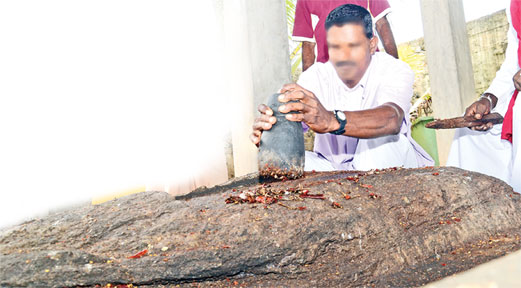 Here
the statues of God Devol stand serene as though providing companionship
to the 'Elephant God' or 'Gana Deviyo' and numerous other gods. The
setting is near surreal, with the 'Kapuralas' clad in white chanting
blessings on pilgrims kneeling in front of God Devol, and touching their
heads with peacock feathers to invoke the God' blessings. Here
the statues of God Devol stand serene as though providing companionship
to the 'Elephant God' or 'Gana Deviyo' and numerous other gods. The
setting is near surreal, with the 'Kapuralas' clad in white chanting
blessings on pilgrims kneeling in front of God Devol, and touching their
heads with peacock feathers to invoke the God' blessings.
Pilgrims getting into a trance and dancing outside the temple after
giving their offerings, is said to be a common occurrence here. And we
were not disappointed.
The Devol Devalaya is sanctified as a sacred place of worship by most
Sri Lankans. Historical records, scriptures, legends and 'sandesa kavya'
written by famous scholars and Buddhist prelates during the 15th century
bear testimony to the sacrosanctity of the Devalaya, with many believing
that God Devol possesses supreme powers to right wrongs, bless the
wronged and punish the wrongdoers.
Rituals and offerings
Blessings and curses are pleaded through rituals and offerings, of
which 'dehi kapanawa' (cutting limes) is said to be the lesser routine,
performed if one had been falling sick often and has fallen prey to the
curse of the 'evil eye'. This ritual is often performed on the beach.
|
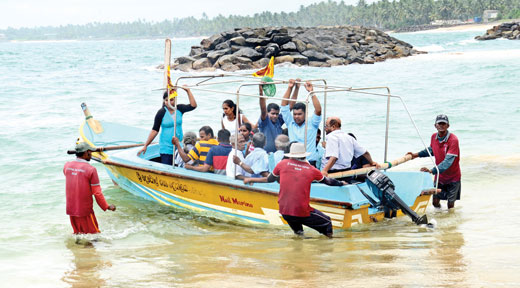
The mechanised ferry boat about to leave with devotees to
the offshore shrine |
The
statues of God Devol, Kinikumbura and Goddess Pathini are located in
different rooms in the main Devalaya. Here's where people come to seek
vengeance, to seek ill-will on their enemies and on those who have done
them wrong.
They tell the 'kapurala' the wrong done to them and the kind of
punishment they want meted out on the offenders. The seek to have their
vengeful desires fulfilled by grind chillies, garlic and black pepper
corns on a special grinding stone just in front of the Devol God
Devalaya, while the 'kapurala' intones the curses.
According to Chief Trustee of the Devalaya, Sarath Disenthuwahandi,
although three categories of devotees pay homage to the shrine, those
seeking divine justice against grave injustices done to them, such as
unpunished murders and abductions of family members, number the most.
The others come to fulfil vows or to seek divine blessings.
|
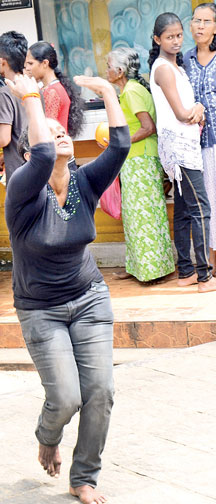
A women devotees in a trance opposite the beach shrine
surrounded by other pilgrims |
Most devotees visit the Devalaya on poya days, but a substantial
number also visit on other 'kemmuru days' like Saturdays and Wednesdays,
he said.
The Devol God is believed to be a living God ever present in the
shrine. This sentiment is confirmed by the Trustee, who claimed potable
water in the two wells that belong to the two shrines - one in the atoll
and the other on the beach - both have healing powers.
Explaining the historical background of the shrines, he said that
during the period of the ancient kings there was a five storey mansion
on the location. Gradually crumbling into ruin it had been completely
destroyed during the period of the colonial rulers.
Special Poojas
|
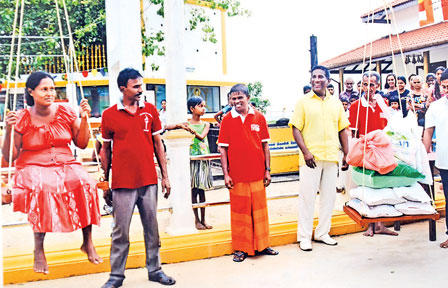
The weight of nutritious food items being matched with the
weight of a pregnant woman |
The Devol God in his human form has practiced occultism and that
tradition continues even today. People suffering from
'difficult-to-cure' infectious diseases mostly seek divine blessings and
fulfil their vows when they experience miraculous healing, claimed the
Trustee, adding that fishermen and farmers who seek the protecting of
the Devol God experience increased harvests.
Special Buddha 'Poojas' are held regularly as offerings to the God.
According to the Trustee, offerings of fruits from devotees are God
Devol's most desired food.
The Devalaya holds three major 'poojas' everyday and special 'poojas'
on poya days, bathing the God in milk, honey and herbal extracts. As
with other temples around the country, the Seenigama Devalaya also has
its annual perahera, and conducted the 48th annual event in August last
year, with appropriate pomp and pageantry.
The Devalaya also has a coin collection facility, encouraging
travellers in buses, vans and other vehicles to drop some coins into the
till, placed at entrance to the shrine area, and acquire some blessings.
The monthly haul from this endeavour is about fifty kilos of coins,
reinforcing the belief in the powers of Devol Deviyo.
(Reported By P. Krishnaswamy, Pix by Wimal Karunatilaka)
|

